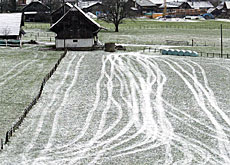
Farmers expect worse to come

The government says recent reforms in agriculture have not caused undue hardship to farmers.
But the farmers’ union says its members are having a tough time and that they need more help to cope with falling prices and the removal of government supports.
Presenting its report on Thursday, the Federal Agriculture Office said the situation for farmers had remained stable during the period from 1999 to 2003.
This was a period during which the sector underwent major reforms, including an end to a price guarantee for agricultural products and cuts to farming subsidies.
The office said that the sector had adapted relatively well. There was a reduction of 2.5 per cent in the number of farms, which was “socially acceptable”. The average farming wage rose from SFr40,600 between 1996 and 1998 to SFr41,700 during the period from 2001 to 2003.
But it noted that farmers’ income was still only up to 60 per cent of that in other sectors.
Pressure
The office warned, however, that farmers would remain under pressure. Last August, Switzerland signed an international agreement with the Geneva-based World Trade Organization (WTO), which foresees the gradual phasing out of protective tariffs and subsidies for farmers.
Manfred Bötsch, the head of the Federal Agriculture Office, said farmers would lose an estimated SFr1.5 billion ($1.3 billion) to SFr2.5 billion from 2008 because of new WTO rules.
He said that for this process to be sustainable, the effects of the deal should be spread over eight years and that farmers should ready themselves for change.
Reaction
Reacting to the report, the Swiss Farmers’ Union said the study showed that many farming families were adapting to the reforms.
According to the report, since 1990 the gap between Switzerland and the European Union in terms of producer prices fell by 28 per cent.
But Swiss consumers are still paying on average 25 per cent more than their EU counterparts for food.
But the union added that, despite the relative stability over the past ten years, many farms still faced financial difficulties and that growth in farming was lower than in other sectors.
It said farmers would be better prepared for the effects of the WTO rules if they were given compensation and other support.
swissinfo with agencies
In Switzerland, the number of farms has declined to around 66,000.
The Swiss agricultural sector accounts for roughly 1.5 per cent of GDP and employs about three per cent of the working population.
Around 70 per cent of farms have diversified to shore up their incomes.
Since 1996, the goverment has given SFr3.9 billion a year to the sector.

In compliance with the JTI standards
More: SWI swissinfo.ch certified by the Journalism Trust Initiative





























You can find an overview of ongoing debates with our journalists here . Please join us!
If you want to start a conversation about a topic raised in this article or want to report factual errors, email us at english@swissinfo.ch.